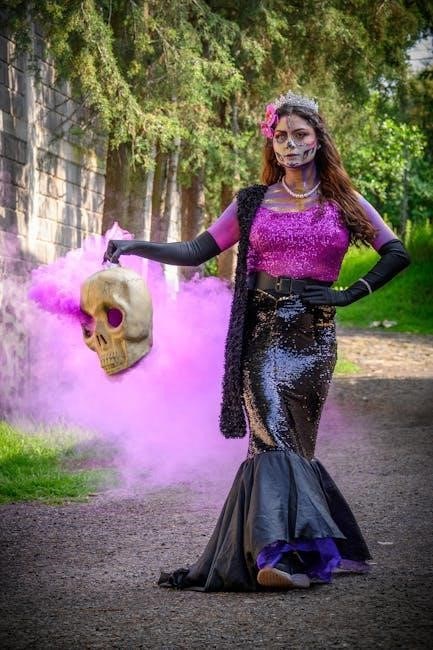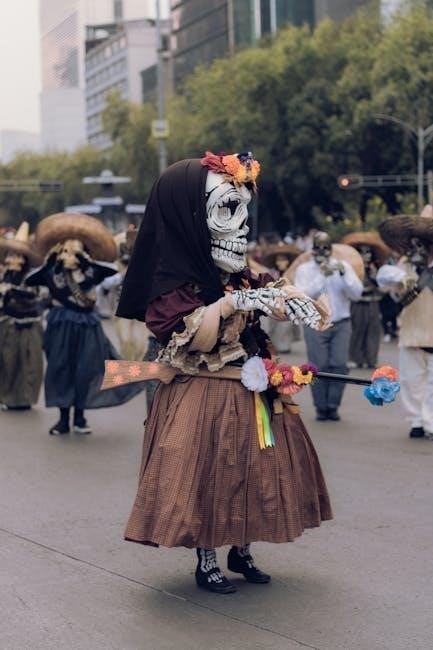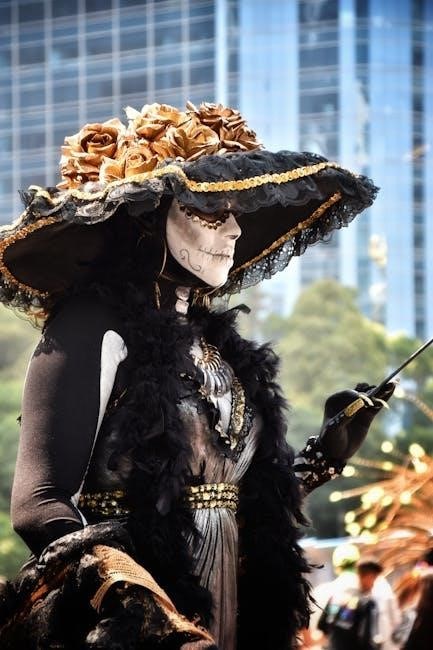
the walking dead comics pdf
The Walking Dead comics are widely available in PDF format, offering a convenient way to read the entire series digitally. Popular platforms provide access to individual issues or comprehensive compendiums, such as The Walking Dead Compendium Vol. 1 and Vol. 2, which cover extensive story arcs; These PDFs are often sized between 100MB to 10.5GB, ensuring high-quality visuals and readability. Fans can purchase or download these files from various online sources, including Amazon and dedicated comic platforms, making the series accessible to a global audience.
The Walking Dead comics are a groundbreaking series created by writer Robert Kirkman, illustrator Tony Moore, and later Charlie Adlard. First published in 2003 by Image Comics, the series has become a cornerstone of modern graphic storytelling. It follows Rick Grimes, a sheriff who awakens from a coma to find himself in a post-apocalyptic world overrun by zombies. The comics explore themes of survival, human nature, and morality in a world devoid of societal structure. Unlike traditional horror narratives, The Walking Dead focuses more on the interpersonal dynamics and ethical dilemmas faced by its characters rather than the undead themselves. The series has gained a massive following for its relentless pacing, emotional depth, and shocking plot twists. Its success has spawned various adaptations, including the acclaimed TV show, but the comics remain the original and most authentic source of the story. They are now widely available in PDF format, making them accessible to fans worldwide who want to experience the gripping tale in its purest form.
The Origins of The Walking Dead Comic Series
The Walking Dead comic series was born from the creative vision of writer Robert Kirkman and illustrator Tony Moore, who sought to craft a unique zombie apocalypse story. Unlike traditional horror narratives, Kirkman focused on the human element, exploring how survivors interact and adapt in a world overrun by the undead. The series debuted in 2003 under Image Comics, with the first issue introducing Rick Grimes, a small-town sheriff who becomes the protagonist. The initial concept was influenced by classic zombie films, particularly George A. Romero’s works, but Kirkman aimed to create a longer, more character-driven story. The early issues set the tone for a gritty, realistic tale of survival, laying the foundation for the series’ success. Over time, the comics gained a dedicated fanbase, leading to expansions like spin-offs and digital formats, including PDF editions, which made the series accessible to a broader audience.
The Creation and Development of The Walking Dead Comics

The creation of The Walking Dead comics began with writer Robert Kirkman and artist Tony Moore, who launched the series in 2003 under Image Comics. The initial concept focused on a zombie apocalypse, but Kirkman emphasized character-driven storytelling to differentiate it from other horror narratives; The comic’s development evolved over time, with Charlie Adlard taking over as the primary artist from issue 7 onward, bringing a distinct visual style that became iconic for the series. The story expanded to explore themes of survival, morality, and human nature, resonating deeply with readers. Over 193 issues, the comic grew into a sprawling narrative, with Kirkman meticulously planning its progression. The series’ success led to digital formats, including PDF editions, making it accessible to a wider audience. This format allowed fans to engage with the story in new ways, further cementing its place in comic history.
The Creative Team Behind The Walking Dead Comics
The Walking Dead comics were brought to life by a talented creative team. Writer and co-creator Robert Kirkman crafted the compelling narrative, while artists Tony Moore and Charlie Adlard provided the visual storytelling. Moore illustrated the early issues before Adlard took over, defining the series’ iconic look. Inker Stefano Gaudiano and colorist Cliff Rathburn enhanced the artwork, adding depth and atmosphere. Letterer Rus Wooton ensured the dialogue and text were seamlessly integrated. Editor Sean Mackiewicz oversaw the production, maintaining the series’ high standards. This collaborative effort transformed The Walking Dead into a critically acclaimed comic, blending gripping storytelling with haunting visuals that captivated readers worldwide.
The Walking Dead comic series, created by Robert Kirkman, Tony Moore, and Charlie Adlard, is a post-apocalyptic narrative that follows a group of survivors as they navigate a world overrun by zombies, or “walkers.” The story centers around Rick Grimes, a sheriff who awakens from a coma to find society collapsed. Alongside his family and a diverse group of characters, Rick confronts the horrors of the new world, facing both the undead and other hostile humans. The series explores themes of humanity, survival, and morality in a desperate fight for existence.
The comics delve into key story arcs, such as the group’s initial survival in Atlanta, their move to a prison, and their encounters with dangerous foes like The Governor and Negan. The series also introduces the Whisperers, a menacing group disguised as walkers, and culminates in a massive conflict known as the All Out War. The final arc, Rest in Peace, concludes the story after 193 issues, offering a poignant reflection on legacy and rebuilding society.
The Walking Dead comics are celebrated for their emotional depth, complex characters, and unflinching portrayal of a shattered world, making them a landmark in the horror genre.

Key Characters in The Walking Dead Comics
The Walking Dead comics introduce a diverse array of characters who drive the narrative and shape the series’ emotional core. At the center is Rick Grimes, a sheriff who evolves from a protective father to a hardened leader. His journey is marked by difficult decisions and personal sacrifices to ensure the survival of his group.
Lori Grimes, Rick’s wife, plays a pivotal role in the early stages, grappling with the challenges of motherhood in a dangerous world. Their son, Carl Grimes, transforms from an innocent child into a capable and ruthless survivor, embodying the harsh realities of the new world.
Other key characters include Michonne, a katana-wielding warrior with a tragic past, and Daryl Dixon, who, unlike his TV counterpart, is not a central figure in the comics. Glenn Rhee emerges as a vital member, providing both supplies and moral support, while Negan, the infamous leader of the Saviors, becomes a central antagonist, wielding his iconic baseball bat, Lucille.
These characters’ complex relationships and development are central to the series’ success, creating a rich tapestry of human struggle and resilience. The cast’s diversity and depth allow readers to connect emotionally, making their fates deeply impactful. The Walking Dead comics thrive on these characters’ dynamics, ensuring a compelling and unforgettable journey.
Major Groups and Communities in The Walking Dead Comics
In the Walking Dead comics, several major groups and communities shape the narrative and serve as pivotal settings for survival. One of the earliest and most prominent is Rick’s group, a ragtag ensemble of survivors united by their quest to find safety. This group evolves over time, facing numerous challenges and losses, but remains central to the story.
The Saviors, led by the infamous Negan, emerge as a dominant force, imposing their rule through fear and violence. Their base, the Saviors’ Compound, becomes a key location in the series, symbolizing both power and oppression.

Alexandria Safe-Zone is another significant community, offering a temporary haven for survivors. Governed by a council, it represents a fragile attempt at rebuilding society. The Hilltop Colony, under the leadership of Gregory, is another crucial settlement, often at odds with the Saviors.
These groups and communities not only provide structure but also drive the plot forward, exploring themes of leadership, morality, and survival in a post-apocalyptic world. Their interactions and conflicts are central to the series’ tension and character development.
Thematic Elements in The Walking Dead Comics
The Walking Dead comics explore a range of profound thematic elements that add depth to the narrative. One of the most prominent themes is the struggle between survival and humanity, as characters are forced to make difficult choices to stay alive while clinging to their moral compass. The series delves into moral ambiguity, often blurring the lines between right and wrong in a world devoid of societal structures.
Another significant theme is the importance of community and how individuals must band together to survive. The comics also examine leadership dynamics, showcasing how different characters rise to power and the consequences of their decisions. Additionally, the series explores the psychological toll of living in constant fear and loss, highlighting the emotional and mental struggles of the survivors.
These thematic elements are woven throughout the story, creating a rich and thought-provoking experience for readers. They not only enhance the plot but also provide insight into human nature under extreme circumstances.
The Walking Dead Comics in Digital Format
The Walking Dead comics are widely available in digital formats, offering fans a convenient way to access the series. Platforms like Amazon, Comixology, and other digital comic stores provide individual issues or collected editions in PDF and other digital formats. These files are often optimized for readability on devices such as tablets, smartphones, and e-readers, ensuring a seamless experience.
Digital versions of the comics, including The Walking Dead Compendium Vol. 1 and Vol. 2, are popular among readers due to their portability and high-quality visuals. Some platforms also offer discounted bundles or sales, making the series more accessible to a broader audience. Additionally, digital formats allow for easy organization and storage, making it simple for fans to build and manage their collections without physical space constraints.
The shift to digital has also enabled global distribution, reaching fans in multiple languages and regions. This accessibility has further cemented the series’ popularity and made it easier for new readers to discover the world of The Walking Dead.
Where to Download The Walking Dead Comics PDF

Fans of The Walking Dead comics can easily access the series in PDF format through various online platforms. Popular options include Amazon, where graphic novels and individual issues are available for download, often at discounted prices. Additionally, dedicated comic platforms like Comixology offer a wide range of digital comics, including The Walking Dead series, in high-quality formats.
Other websites and forums also provide free downloads of The Walking Dead Comics PDF, such as the Compendium volumes and individual issues. For instance, files like The Walking Dead Compendium v01 (2011) and The Walking Dead Compendium v02 (2013) are frequently shared online. However, fans should ensure they are downloading from legal and safe sources to avoid infringing on copyrights or exposing their devices to harmful content. Always verify the legitimacy of the source before downloading any files.
Availability of The Walking Dead Comics in Different Languages
The Walking Dead comics are available in multiple languages, catering to a global fan base. Spanish, French, and other translations are widely accessible, allowing readers worldwide to enjoy the series. Websites and platforms offer PDF downloads of these translated comics, ensuring accessibility for non-English speakers. For instance, Spanish-speaking fans can download HD-quality PDFs of The Walking Dead comics, providing a seamless reading experience. Additionally, fan communities and forums often share translated versions, making the series inclusive for diverse audiences. This multilingual availability has contributed to the comics’ global popularity, enabling fans from different regions to engage with the story. Whether through official releases or community-driven translations, The Walking Dead comics remain accessible to readers in various languages, further solidifying their worldwide appeal; This accessibility ensures that the gripping narrative and artwork reach fans regardless of their linguistic background, fostering a united global fan base.
Collecting The Walking Dead Comics

Collecting The Walking Dead comics has become a popular hobby among fans, with many seeking rare editions and complete sets. The series’ popularity has led to a rise in demand, with some issues increasing in value. Fans often hunt for first prints, variant covers, and special editions, such as the 15th Anniversary cover sets. Digital versions, including PDFs, offer a convenient way to build a collection without physical storage concerns. Platforms like Amazon and comic-specific sites provide affordable options, with sales often featuring discounted graphic novels. However, prices for single issues have risen, from $2.99 to $3.99, making collecting more expensive. Despite this, enthusiasts continue to value both physical and digital formats for their art and storytelling. The availability of compendiums and omnibus editions also makes it easier for collectors to own the entire series. Whether physical or digital, collecting The Walking Dead comics remains a rewarding experience for fans of the genre.

The Popularity of The Walking Dead Comics
The Walking Dead comics have achieved immense popularity due to their unique take on the zombie genre, focusing on human drama and survival. Their relatable characters and intense storylines resonate with fans, making them a staple in modern comic culture. The adaptation into a successful TV series further boosted their appeal, attracting both comic enthusiasts and television audiences. Since their debut in 2003, the comics have maintained a strong following, a testament to their consistent quality and engaging narratives. Critical acclaim and fan loyalty have solidified their place in the comic industry. The availability of digital formats, such as PDFs, has expanded their reach, allowing readers to access the series conveniently. Published by Image Comics, a reputable name in the industry, the series’ credibility and appeal are further enhanced. The Walking Dead comics have also left a significant mark on pop culture, influencing other media and fostering a dedicated fan community. Their enduring success highlights their impact and relevance in the world of comics and beyond.
The Impact of The Walking Dead Comics on Pop Culture
The Walking Dead comics have left an indelible mark on pop culture, transcending the medium to influence television, film, and beyond. Their success paved the way for the critically acclaimed TV series, which became a global phenomenon and redefined the zombie genre. The comics’ dark, gritty storytelling and deep character development set a new standard for horror narratives, inspiring countless adaptations and spin-offs. They also played a key role in elevating Image Comics to prominence, proving the power of independent publishing. The series’ themes of survival and humanity resonated widely, sparking discussions across social media and fan communities. Its influence is evident in other media, such as video games, novels, and merchandise, cementing its status as a cultural icon. The Walking Dead comics have not only shaped the horror genre but also inspired a new wave of storytelling in popular culture, leaving a lasting legacy that continues to grow. Their impact remains unparalleled, solidifying their place as a cornerstone of modern entertainment.

The Walking Dead Comics vs. the TV Show
The Walking Dead comics and TV show share the same core premise but diverge significantly in storytelling and character development. While the comics provide a raw, unfiltered narrative, the TV series expands on these ideas, adding new characters and plotlines. For instance, Dale’s death in Season 2 of the show deviates dramatically from the comics, where his fate is entirely different. Similarly, certain characters like Milton Mamet are exclusive to the TV series and do not appear in the comics. The pacing and tone also differ, with the comics offering a more condensed, intense experience, while the show explores subplots and emotional depths in greater detail. Despite these differences, both mediums maintain the central themes of survival and humanity, ensuring that fans of one can appreciate the other while experiencing unique storytelling. The deviations highlight the creative freedom each medium employs, allowing The Walking Dead to thrive in multiple forms.
Differences Between The Walking Dead Comics and TV Series

The Walking Dead comics and TV series exhibit notable differences, particularly in character arcs and plot progression. In the comics, certain characters like Andrea and Carol have more prominent roles, whereas the TV show amplifies other personalities such as Daryl Dixon, who isn’t even present in the comics. Significant events, like Dale’s death, occur much earlier in the TV series compared to the comics, where Dale survives longer. The setting also varies; the comics focus heavily on communities like Alexandria, while the show introduces locations such as the Saviors’ compound. Additionally, the pacing differs, with the comics delivering a faster narrative and the show exploring subplots in depth. These distinctions allow both mediums to cater to their audiences uniquely, ensuring fans can enjoy both without feeling redundant. The variations highlight how each format adapts the source material to enhance storytelling and maintain engagement, making The Walking Dead a versatile and compelling franchise across platforms.
The Walking Dead Comics and Their Influence on the TV Show
The Walking Dead comics serve as the foundational blueprint for the TV series, with many key story arcs and characters directly adapted from the source material. Major plot points, such as encounters with the Governor and Negan, were heavily influenced by the comics, ensuring continuity between the two mediums. However, the TV show has also taken creative liberties, expanding on certain characters and introducing entirely new ones, such as Daryl Dixon, who is exclusive to the series. The comics’ thematic elements, like survival ethics and community-building, are central to both narratives. While the TV show deviates in some respects, it remains deeply rooted in the comic series’ core concepts. This adaptation strategy allows the show to appeal to both comic fans and new audiences, maintaining its relevance and popularity. The influence of the comics is evident in the show’s tone, character development, and overarching storylines, making them indispensable to the franchise’s success.
The Walking Dead Comics and Their Role in the Horror Genre
The Walking Dead comics have played a pivotal role in redefining the horror genre in modern comics. Known for their graphic and unflinching portrayal of a zombie apocalypse, the series masterfully blends traditional horror elements with deep character development. The comics explore themes of survival, humanity, and moral decay, creating a sense of psychological horror that complements the visceral terror of the undead. By focusing on the breakdown of society and the ethical dilemmas faced by survivors, the series elevates horror beyond mere jump scares, offering a thought-provoking narrative. The use of stark, atmospheric artwork further enhances the eerie and unsettling tone, making the comics a benchmark for horror storytelling in the medium. Additionally, the series’ success has influenced other horror comics, solidifying its legacy as a cornerstone of the genre. The Walking Dead comics remain a testament to how horror can be both entertaining and intellectually engaging, leaving a lasting impact on readers and the comic industry alike.
The Walking Dead Comics and Their Legacy in the Comic Industry

The Walking Dead comics have left an indelible mark on the comic industry, revolutionizing the horror genre and inspiring countless other series. Their success demonstrated the viability of mature, complex storytelling in comics, proving that graphic narratives could appeal to a broad audience. The series’ ability to balance intense action with emotional depth set a new standard for character-driven stories. Additionally, The Walking Dead’s popularity helped establish Image Comics as a major player in the industry, challenging the dominance of traditional publishers. The franchise’s expansion into television, video games, and other media further cemented its influence, showcasing the power of comics as a source of compelling narratives. The Walking Dead’s legacy is evident in its impact on both creators and readers, inspiring a new wave of horror and survival-themed comics. Its enduring popularity ensures that it will remain a cornerstone of the comic industry for years to come, influencing future generations of writers and artists.
The Walking Dead Comics and Fan Communities
The Walking Dead comics have fostered vibrant and dedicated fan communities, creating a shared passion among readers. These communities thrive online and offline, with fans discussing plot twists, character development, and artistic elements. Social media platforms, forums, and specialized websites serve as hubs for fan engagement, where enthusiasts share theories, fan art, and cosplay inspired by the series. The availability of The Walking Dead comics in PDF format has further facilitated accessibility, allowing fans worldwide to join discussions and contribute to the community. Local comic book stores also host events and signings, bringing fans together to celebrate their love for the series. The strong bond between fans and the franchise highlights the enduring appeal of The Walking Dead, ensuring its place as a cultural phenomenon. Through these communities, fans continue to celebrate the series’ legacy and share their enthusiasm with new generations of readers.
The Walking Dead Comics and Their Artistic Style
The Walking Dead comics are renowned for their distinctive and immersive artistic style, which plays a crucial role in bringing the post-apocalyptic world to life. The series, primarily illustrated by Charlie Adlard and Tony Moore, features a stark, gritty aesthetic that emphasizes the harsh realities of survival. The use of black-and-white artwork creates a haunting atmosphere, with detailed shading and textures that enhance the emotional depth of each scene. This visual approach aligns perfectly with the horror and suspense themes, making the comics a standout in the genre. The artistic consistency across issues ensures a cohesive narrative experience, while the dynamic panel layouts keep readers engaged. The success of this style has influenced other horror comics, solidifying The Walking Dead’s place as a visual landmark in the medium. Fans and critics alike praise the artwork for its ability to convey the raw emotion and tension that define the series. The artistic style remains a key element in the enduring appeal of The Walking Dead comics.
The Walking Dead Comics and Their Storytelling Approach
The Walking Dead comics are celebrated for their gripping and emotionally charged storytelling, which has captivated readers worldwide. The series masterfully blends horror, drama, and suspense, creating a narrative that explores the depths of human nature amidst a zombie apocalypse. Writer Robert Kirkman crafts relatable characters, placing them in morally complex situations that challenge their survival instincts and humanity. The comics often feature intense, unpredictable plot twists, keeping readers on edge. Unlike the TV adaptation, the source material delves deeper into the psychological struggles of its characters, offering a raw, unfiltered look at their experiences. The storytelling approach emphasizes long-term character development, with arcs that span years, allowing readers to witness their growth and transformation. This layered narrative style, combined with its ability to tackle dark themes, has solidified The Walking Dead comics as a landmark in the horror and graphic novel genres. The series’ success lies in its unflinching commitment to storytelling that resonates emotionally and intellectually with its audience.
The Future of The Walking Dead Comics
The future of The Walking Dead comics remains bright, with ongoing developments promising exciting new directions for fans. Despite the conclusion of the main series, spin-offs and special editions continue to expand the universe. Digital formats, such as PDFs, ensure accessibility, allowing readers to explore the series on various devices. Recent price adjustments for single issues and collected editions reflect the comics’ enduring popularity. Image Comics, known for its horror genre successes like Wytches and Rumble, is expected to maintain its innovative approach with The Walking Dead. The rise of digital platforms has made the comics more accessible than ever, with options to download full volumes or individual issues. Additionally, translations into multiple languages, including Spanish, broaden the global reach. As the franchise evolves, the comics will likely introduce new characters and storylines, ensuring fresh content for both longtime fans and newcomers. The Walking Dead comics’ legacy is poised to grow, solidifying their place as a cornerstone of modern graphic storytelling.
The Walking Dead comics have cemented their place as a cornerstone of modern graphic storytelling, blending gripping narratives with visceral artwork. Their enduring appeal lies in their ability to explore human drama amidst a post-apocalyptic backdrop, resonating deeply with readers. The series’ moral dilemmas, character development, and unflinching portrayal of survival have captivated audiences worldwide. The availability of these comics in PDF format has further expanded their reach, making them accessible to fans across the globe. As the franchise continues to evolve, its legacy as a cultural phenomenon remains unshakable. The Walking Dead comics have not only redefined the horror genre but also inspired countless adaptations and spin-offs. With an active fan base and ongoing digital distribution, the series ensures that its impact will be felt for years to come. For both longtime enthusiasts and new readers, The Walking Dead comics remain a must-read, offering a haunting yet thought-provoking journey into a world gone mad.